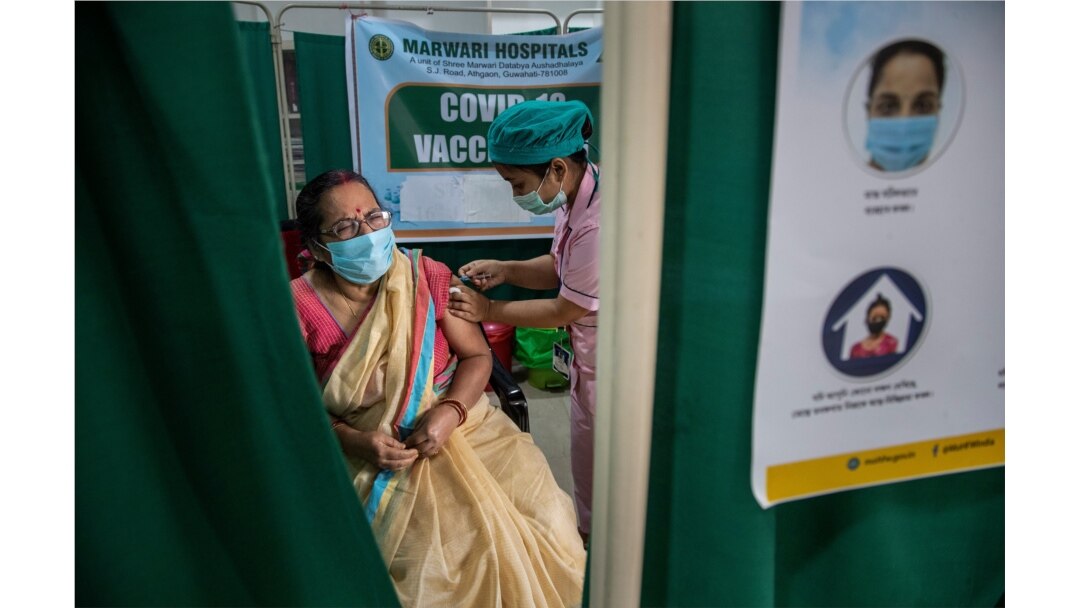India's inoculation drive against Covid 19 has got a massive boost as it begins offering vaccines to older people.
In a dramatic change from the vaccine hesitancy that had marked the inoculation program, senior citizens lined up enthusiastically for jabs as the world’s second worst hit nation expanded its drive to cover people above the age of 60 and those older than 45 with certain ailments this week.
The initial rollout that covered healthcare and frontline workers had been sluggish as some did not turn up for the shots. But a surge in cases in a handful of states like Maharashtra and Kerala in recent days has created a fresh sense of urgency. In some places variants that scientists fear could be more infectious have intensified worries.
“By the time the vaccination program started in middle of January, the threat perception had significantly decreased, and it was felt as though the pandemic had virtually disappeared from India,” says K. Srinath Reddy, President of the Public Health Foundation of India. “The finding that pandemic has not gone away is very recent.”

An elderly woman receives the COVID-19 vaccine at a private hospital in Gauhati, India, March 4, 2021.
India has administered more than 16 million shots so far raising questions on why a country with an ample supply of vaccines was not moving to inoculate people faster.
The Health Ministry says vaccinating people is a priority and is urging states not to lower their guard. Inoculation centers were hugely expanded this week to speed up the drive -- the target is to reach 300 million by August.
The shots are free at government hospitals and sold for $ 3.40 per shot at private hospitals.
“The marginal increase in cases is a cause for worry,” Vinod Paul, Member, National Institution for Transforming India, told reporters Wednesday. “We cannot take it lightly at all.”
Prime Minister Narendra Modi was among the first to get the jab this week. In a tweet he urged people to do the same. “Together, let us make India Covid-19 free.”
“In India there are huge political followings and once the leaders take the vaccine, it becomes a green flag for the followers to espouse the vaccine,” says Reddy.
Modi and several other leaders took a domestically developed vaccine that some have been reluctant to take because final efficacy results are not yet available. Covaxin is one of the two vaccines being administered in India.
But interim data released Wednesday showing that it is more than 80% effective will boost confidence in the vaccine and expand India’s drive, hope experts. The company making the vaccine also announced that early indications show that it is also effective against the more-contagious variants of the coronavirus.
“It is vital we don’t let this gain that India has made slip away and go the Europe way, where after initial victory they are facing a second lockdown,” according to Arvind Kumar, Chairman, Institute of Chest Surgery at Medanta Hospital in Gurugram.
A woman poses for a picture with a cardboard cutout after receiving a dose of COVISHIELD, a COVID-19 vaccine manufactured by Serum Institute of India, Mumbai, India, March 1, 2021.
The hope is that if India can inoculate enough people in the coming months, it could break the chain of transmission in a country where millions have already been exposed to the virus. A national survey showed that up to a quarter of Indians have antibodies to the Covid 19 virus. Studies in some crowded districts have indicated a higher prevalence.
While health experts stress that India is nowhere near what is called “herd immunity,” some are optimistic that could change if India can meet its target of inoculating 300 million people over the next six months.
“If we add these people to those that already have antibodies to Covid, we might be hitting that 70% magic figure for herd immunity,” says Kumar “This may reach us to that tipping point after which the numbers may start coming down automatically.”
Some of the biggest turnouts for inoculations were seen in cities like Mumbai that were the epicenters of the pandemic and which have witnessed an uptick in cases.
Questions about vaccines that have been developed in record time linger. But weary of the pandemic, most are ready for the shots. Some like Rashme Kohli, a New Delhi resident took the jab on the first day that the drive opened for senior citizens.
“I have not gone out for a year and I feel safer to move around a bit without the fear of the virus,” says Kohli.
Others are waiting their turn. “Even if it is good only for a certain period of time, I think we should go for it. I certainly will,” says Ratna Dehadrai, a resident of Gurugram, on Delhi’s outskirts.
India’s two advantages – a significant reduction in infections and ample supply of shots in the world’s largest vaccine producer have raised hopes of building on gains made so far in a country that has counted over 11 million cases.

